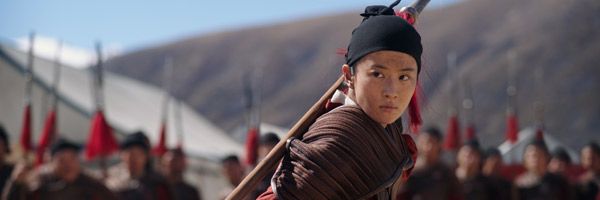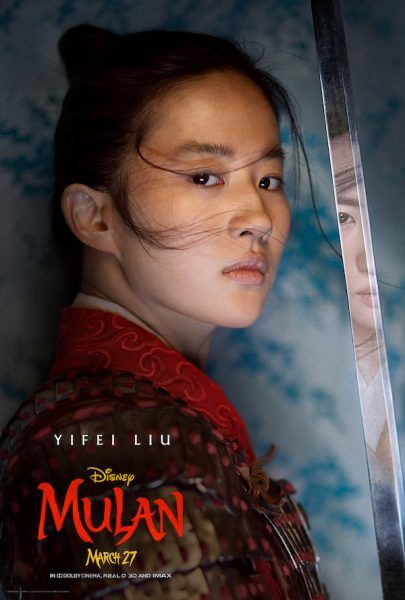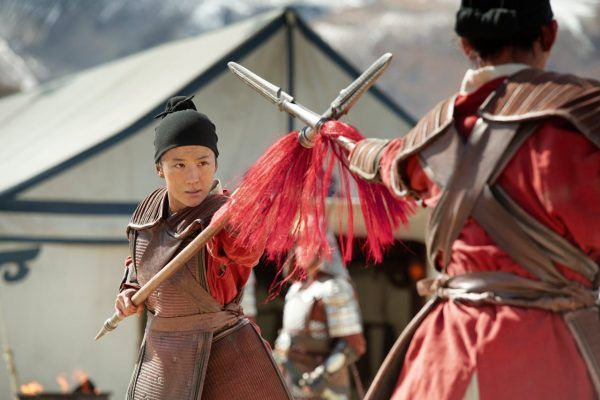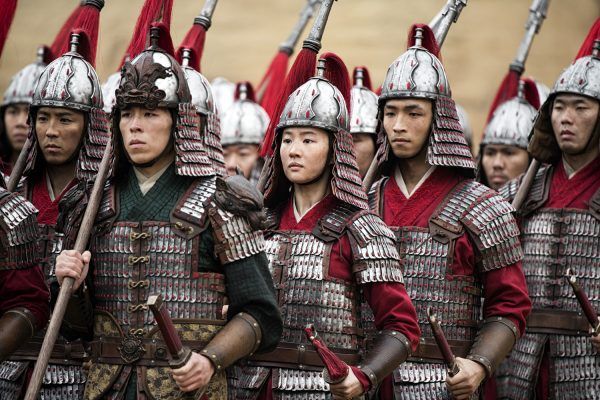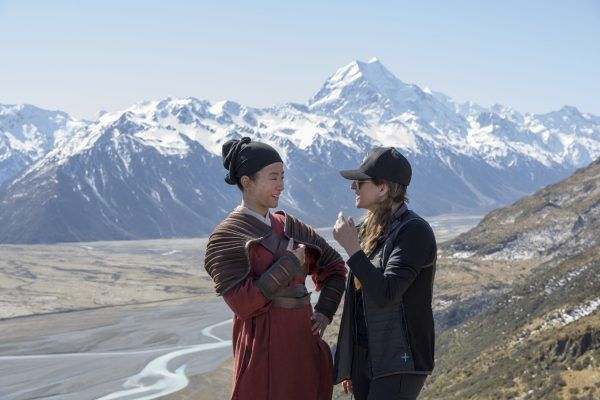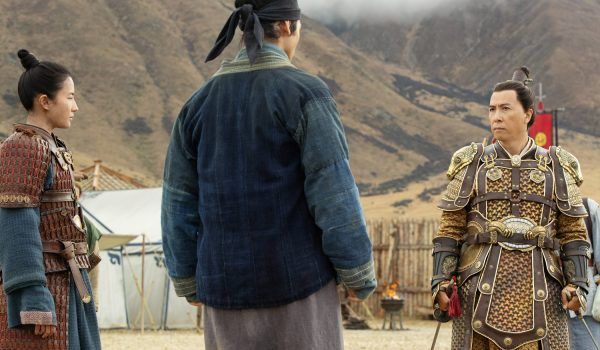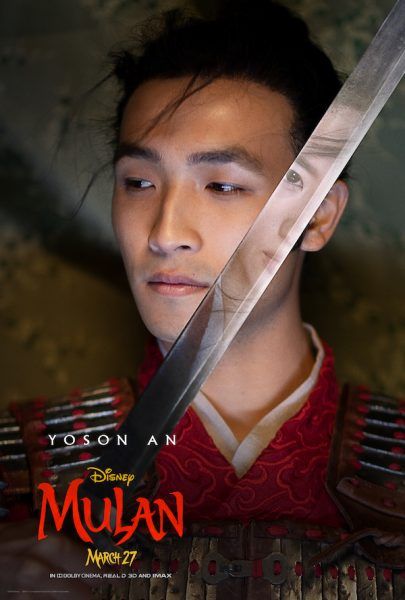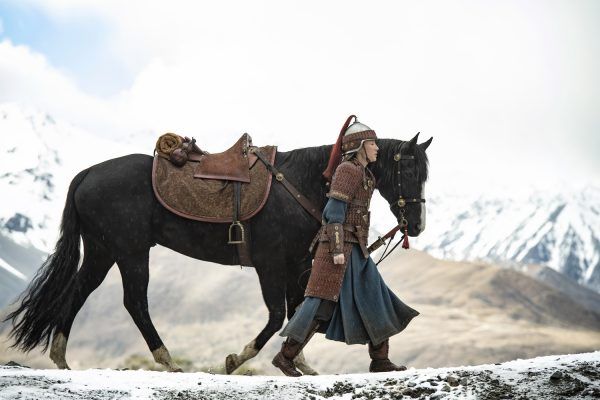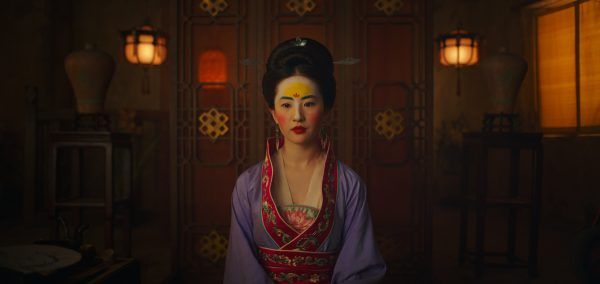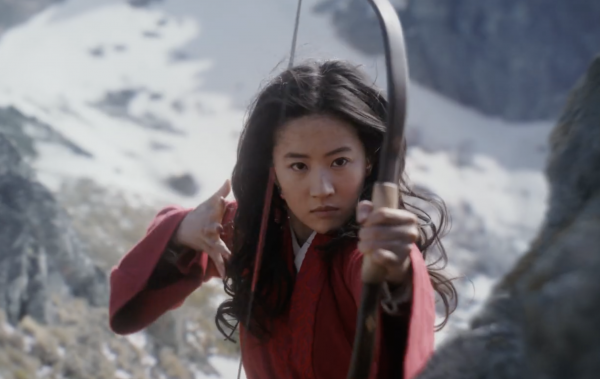Disney fans have been treated to many remakes of their favorite classic animated feature film over the last few years, from Cinderella to Aladdin. The next effort, Mulan, is set to hit theaters on March 27th of this year, and it will not be a beat-for-beat retelling of the 1998 animated movie (Thank the Lord!). While the trailers show off thrilling fight sequences and mythological elements, the devoted fans are (understandably) upset about the removal of Mushu and the original’s classic songs. During an interview on the set of Mulan with Collider along with a small group of reporters, producer Jason Reed breaks down why those choices were made and promises we’ll be treated to stunning action and epic storytelling. It all starts with finding the leading lady. Disney set out on a global search to cast someone who can speak both English and Mandarin Chinese and has the physicality to take on strenuous fight scenes. In the end, the studio chose Chinese actress Yifei Liu after auditioning thousands of actresses for the role. Aside from her fierce fighting skills, Liu is known for her role as The Golden Sparrow in Forbidden Kingdom, alongside Jet Li and Jackie Chan.
The cast of Disney’s Mulan also includes Donnie Yen (Star Wars: Rogue One), Jet Li (The One), Gong Li (Memoirs of a Geisha), Jason Scott Lee (Dragon: The Bruce Lee Story), Yoson An (The Meg), Tzi Ma (Arrival), and Rosalind Chao (Star Trek: Deep Space Nine). The Mulan team had a council of Chinese historians who served as advisors during the development phase, as well as 25 different experts in various areas that were helping with design, costumes, makeup, architecture, and story.
During the course of our conversation, Reed talked about the difference between director Niki Caro’s Mulan and the original animated, making a movie that delivers for different audiences, and whether there will be a cameo from any voice actors of the original. Mulan hits theaters on March 27th, 2020 and tickets are currently on sale.
Our conversation begins with Reed discussing an action scene being filmed during our interview.
JASON REED: Yifei is just… she is unbelievable. She’s been training with us since April. She’s obviously done a lot of martial arts before and is in very good shape but she’s been working with the stunt crew. We have a very high-end athletic trainer that works with us and so she’s been working with the both of them, working every day for months and months now.
Is this an action scene now?
REED: Yes. This is just a rehearsal. So we shot a version of this, a little wider version of this this morning with the stunt person and now this will be Yifei’s first run-through in it herself. One of the great things is - a lot of times the stuntees come out and they do the bit and the actors come in and you go “well that’s nice” and we’ll work really hard so you look as good as the stunt people. [Yifei] is as graceful as any sort of professional athlete or any stuntee. She’s just really skilled and works really hard at it.
Donnie Yen also is like that. We were doing Tai Chi, he was leading our recruits in a Tai Chi session down in the training camp set that you guys are gonna see later. We had set it up and it had tons of people. We set it up and we had the choreographer come out and do their version and she’s amazing and how she moves and everyone’s like “wow that’s really good”. Then Donnie Yen came out and he did it, and literally, at the end of the take people - everyone stood up and clapped, they were like “Oh my God, holy cow”
How many different types of technique and martial arts are in the movie aside from Tai Chi?
REED: Well there’s a lot of different techniques because we draw from different styles, but there’s only two major sort of distinctions. The Rouran army, the Northern invaders has one style of movement, which is a little rougher, a little less refined in terms of how they move. They’re also horse-based as it was traditional with the Northern Nomadic tribes. And then the Chinese Army within it sort of has two styles - one is this sort of traditional ancient military style which is about formation building and moving in coordination and all of those elements of soldiering that were typical of large armies of that time. And then inside of that we have Yifei and Donnie (Command Tung) who have a little extra, who can go out and do more sort of wushu influenced arts.
Since Yifei has performed Wuxia type films before, is that an influence on this film as well?
REED: Yes very much so. And one of the cool things - you can all fact check this later because I may be totally wrong but my understanding is that - Wushu was originally developed for women in ancient China. Because of the way the movement worked is more optimized for female physiology. Like IP Man, one of IP Man’s trainers and one of Bruce Lee’s trainers were women that helped him do this. Donnie’s mother was one of the first Wushu trainers in America, I believe. She actually opened a Wushu studio in Boston in the 80s.
One of the most iconic elements of the originals are the sidekicks - the cricket and the dragon. How are they going to be incorporated into the live-action version?
REED: Wow, we made it 10 minutes before that question (laughter). Obviously Mushu is a beloved character and one of the most memorable elements of the animated film. It turns out that the traditional Chinese audience did not particularly think that that was the best interpretation of the Dragon in their culture, that the dragon is a sign of respect and it’s a sign of strength and power, and that sort of using it as a silly sidekick didn’t play very well with the traditional Chinese audience. So as we thought about how we were gonna approach this movie -- and the world has changed quite a bit since the animated movie was made. So we went back. When we started working on this we didn’t just go to the animated movie. We went all the way back to the original “Ballad of Mulan” and to the many many variations of that ballad that have been told in China since it was originally created, and we looked at five to six core versions of that. Then we looked at a couple of modern film and TV adaptations that have been done in China and then we looked at the animated movie. And then we really sat back and thought about “how do we make this movie in a way that delivers for multiple audiences?” I think there are four or five core audiences. When we sat down and really analyzed who this movie was going to be for we thought there were five core audiences.
There’s the audience in China, which wasn’t really available to the animated movie because there wasn’t Western distribution there, Disney didn’t have distribution there. So, the Chinese audience, the Asian Diaspora community worldwide, women -- because I can’t tell you how many people I know including my wife, [for them] to see a female action hero when they were young was a great thing. And Disney movie fans. Now you’d think those were all, like, there’s a venn diagram where all those meet in it. It turned out it was actually more like the Olympic rings. The traditional Disney audience and the diaspora Asian audience viewed the movie in one way and the traditional Chinese in China audience viewed a slightly different way. So we really dug in to try and make sure we that we were addressing both of those audience in a thoughtful way. And I think that we -- I hope, knock on wood, I think we found a way to tie both of their, sort of, the way they look at the movie together. As a concrete example, traditionally the story of Mulan is a story about a young girl finding a way to do her duty. And it’s all about duty and kind of about the devotion to the Confucian order, and for what we found in our research that was for the Diaspora community. They read it as a story about a young girl finding her way against her parents, that despite the rules and despite the traditions, she found her own way forward. So those are sort of two completely different ways of reading the story.
**Subject changed due to what we’re seeing on the monitor - Mulan’s battle scene**
REED: So what we realized as we’re looking through it is that while it’s a story of an individual finding their true self and finding their inner truth, but ultimately she’s doing that in service of the Confucian ideal so she is finding a way to do her duty but she can’t do it in the way that young girls were normally expected to, so she finds her own way against the norms of society but ultimately fulfills her destiny.
So will she have any sidekicks in the movie? And they were also the comic relief in the movie
REED: There will be a mythological sidekick of sorts in the movie but I will not say anything more than that. Except that it is not Mushu.
Speaking of mythological, it’s been reported that the villain will be played by Gong Li who’s playing a Witch, so what decisionS led you to bring that kind of fantastical magical element into the movie.
REED: We want to save some of those surprises. But we made a number of choices in the development of the movie to try to expand the perspective of how we looked at various things. For instance, we wanted to have a female antagonist in the movie as well as just having a male antagonist so that we could explore female power in that society in different ways. And have different perspectives on it. There are some other characters that we added, or bifurcated that have helped us do the same thing in other places.
Another thing I was curious about, you added a sister for Mulan. Traditionally in China, they talked about she feels responsible to take care of her family and go back because it’s the sacrifice of an only child. What was the reasoning behind adding a sibling?
REED: To add more of that, to lean into that -- and there are several versions. In the original ballad she’s the only child. In some later versions of the story from China in a very famous play from the 1500s she had a sibling, she had a younger sister. So we really liked that, in adding that to the mix because in plays into exactly what you were saying, it makes it more than just her having to take care of her father and mother, who are sort of in the role of taking care of her. By adding a younger sister we thought it added sort of a broader emotional context and added more motivation for her, particularly for the end
About Mulan having long hair - does this mean the iconic hair cutting scene is out?
REED: In the Disney film, the scene where she’s cutting her hair off it’s actually an anachronism. So Chinese warriors, male warriors wore their hair long. Chinese men wore their hair long. For her to cut her hair off, it would make her look more like a woman than less like a woman in reality. Since we’re doing the live-action version, because we’re looking at the worldwide market we thought we had to bring that level of cultural accuracy to it.
Assuming this is the big reveal scene. Is having her hair down and flowing in the wind like that symbolic of her finally embracing her identity?
REED: Yes. We refer to this [referring to the monitor] as her “warrior princess” look. When we first see her early in the film, as a simple village girl, her hair is back but down (in a ponytail). She’s very traditional. When she goes into the army she has to wear her hair up in a top knot like all the men do so she blends in and looks like everybody else.
And then before she comes into this scene, she realizes that in order to help her comrades and fulfill her duty that she needs to be true to herself as well and in part of that is, as we visualize it exactly, her hair comes down, it’s flowing in the wind, she’s totally kick ass. And that’s how we try to visually mimic the thematic of the story as well.
What can you tell us about the role of the music in the film? Is there a chance we’ll hear any of the songs?
REED: We’re trying to keep some of our tricks a secret. However I can guarantee you that there will be songs you recognize and remember will in the movie. It will not be traditional break into musical. They’re not going to stop their workouts and do a big musical number to camera. However, there are a number of songs that are iconic for the movie and tell a great version of the story and they are very helpful to us in how we’re putting the movie together. And it gets a little easier in animation to keep the tension and the reality in place and still have people break into song and sing to camera. We made the decision that we wanted to keep the world -- even though it’s a fantasy -- more grounded more realistic so those emotions really played and the threat is very real so we are using music in a slightly different way.
So Disney, obviously Mulan this is bringing a classic animated film and now they’re doing a live-action. We’ve seen it happen a couple of times recently - Beauty and the Beast, Jungle Book, Alice in Wonderland which had no music in there, which of those would you say this is more similar to?
REED: Haven’t seen Lion King but I’m assuming we’re probably more like Jungle Book?
In the same vein, since I’m from D23, what makes this a “Disney Project”?
REED: I think when I think about what I love about what the Disney brand is, and the Disney ethos, is that they’re foremost fun and entertaining but there are elements that are sort of particular to Disney. One is that they have thematic value and that these stories at any level help us look at the world and talk to our children about things that will concern them or things that are maybe more difficult for us to discuss in general and give people...
Do you have a lot of Chinese historians or experts on set to kind of help you?
REED: Not on set as much as we had a council of advisors working with us in the development and design phase. We imported all of our stunt riders, we have like 65 stunt riders from Mongolia, we have another 45 from Kazakhstan. So we have a lot of Chinese folks around our whole stunt team, the vast majority of our stunt team is from China. And a number of our actors are obviously from China so we get little tweaks here and there but we had 25 different experts in various areas that were helping with design, costumes, makeup, architecture, story. And we also did some work with not only Chinese-Chinese, but we did some work with our partners at Disney looking at how Chinese-Americans view the movie and Asian-Americans general view the movie so we did a number of meetings with researchers and sociologists and storytellers in that area as well that gave us a lot of important feedback on how we’re approaching it.
I heard that you really only auditioned actors who could speak Mandarin. Were you worried because the movie is so huge for Asian-Americans, women, in particular, were you worried about how that would affect Asian-American women viewing the film or the actors who might have been dying to audition for a movie like this?
REED: Yes and no. When we sent out an initial casting call we were targeting Mandarin or Cantonese speakers. And that was more about making sure we did our due diligence to go deep enough into that community and have that authentic voice, no pun intended, in that place. But we did open up the search for, there were a lot of people we that looked at who did not have those language skills. And there are a number of people in the movie now for the -- that was really for Mulan. And then everybody else we had a much wider - we didn’t have that same language preference for everybody. So we have a lot of actors from -- our team, we have a lot of Americans, Australians, but all ethnically Chinese.
Two characters I’m curious about, her hilarious grandmother and her love interest. Can you talk about their presence in the film? Will it be similar to the original?
REED: The hilarious grandmother is not in the movie. We really focused on the mother and father and sister as that relationship. So Li Shang in the movie, and he became sort of an LGBTQ icon. So there a little backlash online when we weren’t casting a character named Li Shang. I was actually a little surprised but it made sense without full understanding of what we were doing in the story. I think particularly in the time of the #MeToo movement, having a commanding officer that is also the sexual love interest was very uncomfortable and we didn’t think it was appropriate. And we thought that in a lot of ways that it was sort of justifying behavior of we’re doing everything we can to get out of our industry. So we split Li Shang into 2 characters. One became Commander Tung (Donnie Yen) who serves as her surrogate father and mentor in the course of the movie. The other is Honghui (Yoson An), who is her equal in the squad. There’s no power dynamic between them but there is the same dynamic in the original movie that was with Li Shang which is “Hey I really respect you and why do I like this dude so much? And what does this say about me?” and we have that same dynamic and in this movie, I actually think it plays in a more sophisticated way because he’s trying to befriend this other soldier who is, like, he’s ambitious, he wants to be the best student in class and all of the sudden this guy is sort of challenging him. He’s sort of standoff-ish also like “Hey, we could team up. We’re going to war, let’s work together.” And she, because she’s got this secret she keeps having to push him away and it creates a lot of tension in the movie of him being drawn to her, her being drawn to him, but because she has this secret she constantly has to push him away. So we’re playing with that as well. And I think we removed the icky-ness of the power differential.
With the knowledge of what Li Shang means to the LGBTQ community going into this movie, how are you owning that in the relationship dynamic?
REED: Well Honghui - it’ll play the same way as it does in the animated film.
Are you taking it further or being more direct about it anyway?
REED: No, we used the animated movie as the model for that level of relationship.
You mentioned earlier, Mulan came out a long time ago and now we’re in a whole different era and society. What was Disney’s biggest concern with making this movie?
REED: I think Disney very rightly was - they were very much focused on the opportunity of it, as opposed to the challenges. But in executing some of those opportunities there were lots of things we had to worry about. So I think finding a way to communicate with the Chinese audience to making it - historically there had been some resistance to the animated movie in the Chinese market when it was exposed through home video and things like that and we wanted to make sure that we’re fully aware of those concerns and that we address them where we could and that we understood them even in places where we didn’t feel like we could address it. And that we really find that balance.
Originally this movie when it was first *inaudible* release day, it was supposed to come out this year (2019). So what was the specifics that caused the need to be pushed back? What was taking longer than it was supposed to?
REED: We waited for Yifei. Once we went through that search and we determined that Yifei was the person we wanted and that she had the correct spirit and the correct determination and work ethic. She was doing a TV show so she wouldn’t be available to a certain point. And the point when she was available, the weather was terrible for us. We had to wait, we pushed production five months which was interesting. Also the previous release date, if I’m totally honest that first release date was a placeholder anyways, and it was some ways intended to scare off anyone who wanted to make a Mulan movie. When we actually ran the real schedule for how we’d actually reach that date that was originally put in, which was March of 2019. What we would have had to do to get that date would have compromised the movie.
I work in both China and the US. There’s going to be a lot of disparities between the two, on how to please both audiences, especially with the LGBTQ topic with how you’re going to have Honghui. How are you planning to address that to keep it to both Chinese audience and US audience because if there’s anything they’d censor.
REED: Well we’ve worked very closely with SARFT and with Chinese Film Corporation as well as with our partners that have helped us set up the physical production in China. We feel we’re secure in the censorship issue, our permits were approved and I believe we’ll continue to have a good relationship with the releasing entities and our various partners in China. So I don’t think that that’s going to be an issue. In terms of the creative balance of the movie, it is a very difficult road to walk and we’ve had to make a lot of choices about, you know -- as an example, the hair-cutting scene which is a favorite for American audiences, and they love the hair-cutting scene. But in China, that would have been… we immediate get, like, mocked for that in meetings China so… like “oh you’re gonna have her cut her hair off again?” and ha ha ha, It’s like no, ok. So we’ve had to make those choices because now we have another audience to take into account. It’s finding a balance.
How would you describe the comedy in this film, compared to the original? Would you say it’s about the same amount or less?
REED: I would say it’s slightly less but still very funny. I think we leaned more into the action/adventure movie. For me personally, I felt like there haven’t been a lot of family-accessible, female-driven action/adventure movie, and that was the thing that in the marketplace really haven't been serviced before. As you can tell, we’re leaning into the grand scope -- the scale, the beauty, the action, this sort of, the heroism of it. There is comic relief, it is not as, um, you’re never gonna compete with Eddie Murphy doing his schtick. Take one of the greatest comedians of all time, make him a dragon, have him prance around, give him 2 years to refine the jokes. We’re not gonna beat that in terms of raw comedy. But we’ve added a couple of elements of this movie, which really do the same thing as like grounding it, really bringing you into it. We have some scenes that -- although they’re played very real, are gonna get some very big laughs. In fact, the beginning of this battle sequence (referring to the battle scene we’re seeing on screen) have a laugh moment in it, believe it or not. Like, we’re going to have this terrifying Rouran army up on the hill, and it’s all super serious and a couple of things happen in the line that I think will be crowd-pleasers. Particularly because of the tension, you’re gonna get that big relief.
Speaking of elements that you added to this film, there’s new fantasy element because of the Witch character. How prevalent would you say that fantasy element is in this film? And also was it influenced much by Chinese mythology?
REED: One of the things that -- as we were talking to filmmakers in China about how we can best -- going back to this, how do you service two audiences, how can we make a movie that bridges… obviously there’s been a number of movies that have failed in their attempts to tell Western versions of Chinese stories, or vice versa. And so one of the things that was made clear to us from the very beginning was “make a Disney movie”. Don’t try to make the Chinese version of Mulan because they’ve already made it several times. And they’ve already seen it. So if you wanna make something that’s going to play the Chinese audience and be interesting to them, make the Disney version and what that meant to us was that we had to bring the highest level of execution, production design, costume, hair makeup, the cinematography. The people that we hired, they’re hired with the expectation that we wanted awards caliber work and that they weren’t meant to think about this as a kids movie or an animated remake or any of those things. Our references are David Lean and [Akira] Kurosawa, it’s not… we’re not looking at 101 Dalmatians… which is a great movie, I love it.
Mandy Walker, who we chose for a couple of reasons but mainly because she does big, epic, grand-scale cinematography and so it was very important to us to have somebody that had that kind of ambition as our cinematographer. It certainly helps that she’s also a woman, which is one of the things that we really wanted to, you know -- our director, our cinematographer, our first AD, our co-producer, our costume designer, are all women at the top of their game and so I thought that was really important to bring that to the movie as well. Three of our four writers are women so we thought that was really important to bring it as well.
We saw a still earlier of a young Mulan, anything you can tease about that? Actually jumping off that, can you sort of walk us through the main beats of the movie and highlight any similarities or divergences from the animated film?
REED: It follows a very similar story to the animated film. All of the major beats are sort of the same in the sense that there are invaders from the North, the emperor raises army, sends out the notice of conscription, her father Hua Zhao who is informed is going to go even though we know it would mean almost sure death. And Mulan refuses to do that and takes his place and then has to go to training camp, learn how to be a soldier, goes to battle with the invaders from the North and is victorious - not to spoil the end. So, she’s victorious, gets the emperor’s approval then returns home. So those are the main beats of the animated movie, those are the main beats of this [movie].
One of the areas we diverged from the original is we actually start with Mulan as a child. We see her spirit, we see that she isn’t like the other kids and we see the difficulty that causes her parents which then becomes a theme of the movie in that she doesn’t fit in, and she doesn’t know her place. And everyone’s very concerned for her. She has all these great qualities about her but she doesn’t do things the way that a young girl is supposed to. And it isn’t until she’s dressed as a boy that people encouraged those things in her. So when she actually ends up in training camp, Donnie Yen who plays Commander Tung is watching her fight and she’s always holding back. She’s trying to hide what she’s good at, like, she’s trying to hide her energy. Commander Tung is like “Lean into it! You’ve got this great gift why aren’t you doing it?” which is the opposite of exactly what she’s been told her entire life. So really it wasn’t until she becomes a boy, she becomes a complete woman. But that’s one of the ideas that we’re playing with, is once you take away the gender expectations from her, she can really embrace the things that are true to her. We show some of that in some very fun sequence when she’s young, which can’t wait for people to see because it’s a very funny day. I know you’re concerned about the comedy, we open with a very very funny sequence of her and her family… well her creating havoc in her village. And her dad… I have two girls so I really connect to this part of it. Her dad’s watching her do all this crazy chaos and he’s super proud, and then everybody else is like “what are you doing?” And he’s like “oh yea, right. You shouldn’t do that”. We basically have that beat in the movie where the mom, much like my wife, is like “Do not encourage her, that is terrible! That’s gonna get her in trouble in school”. So I’m glad you saw that image because it’s a pretty fun sequence in the movie.
Accents play a big part in Mulan and all the movies, like in the Chinese version they had different accents when they speak Chinese. And in the animation, some of them have Chinese accent, some of them have an Americanized accent. How are you going to play on this one? Especially since you have a mixture of Diaspora and also Chinese actors?
REED: It has been an incredibly complicated process. Our actors have hinted to an amazing amount of work and training. We have two of the best dialect coaches in the world who we have brought in. They’ve been here since May (2018). We have actors with Cantonese accents, with Boston accents, with Australian accents, New Zealand accents, Mainland American accents. So we have to take all of that and we wanted to create sort of a cohesive world that felt real and so what we have created so sort of a Chinese-influenced American dialect that we’re working with everybody to aim try to towards. So our American actors are having to learn how to bring a sort of a Mandarin accent to it, and our Cantonese actors are having to learn how to bring a Mandarin accent to it. And our Mandarin speakers are learning how to bring sort of an American energy to their performance so it has been complicated and to be honest, I had no idea how complicated language was until I sat in a couple of these sessions… with flashcards, they do all kinds of exercises, and I was like I can’t speak English well enough to do any of this.
For more on Mulan, check out our additional set visit coverage.

